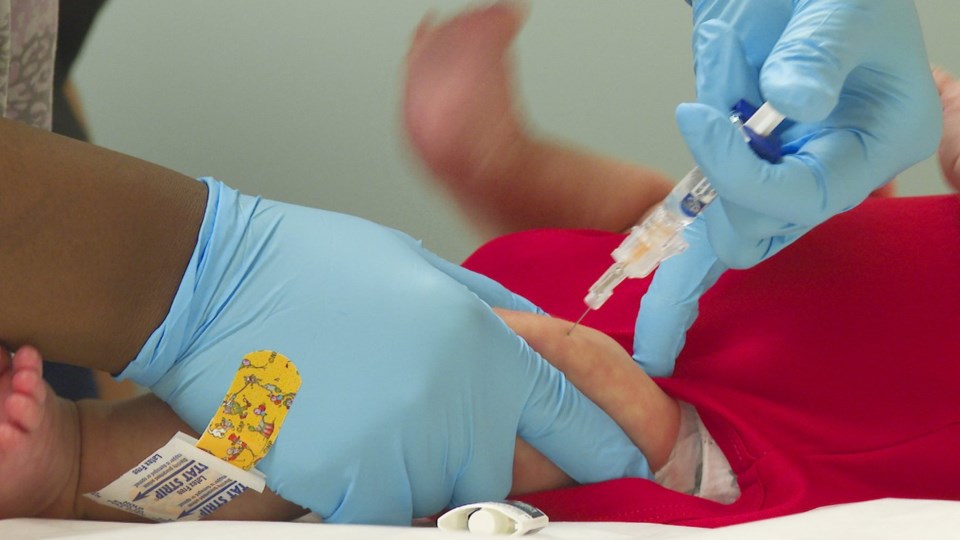TORONTO — Whooping cough is on track to reach a record number of cases in Ontario while infections climb in eastern provinces and decline in Quebec, but experts say trying to predict the course of the highly contagious disease has been especially difficult this year.
This is the first time the disease has circulated to a significant extent since pre-pandemic years and in contrast to influenza, it doesn't follow a predictable pattern apart from resurging every few years, says Dr. Jesse Papenburg, a pediatric infectious diseases specialist in Montreal.
Like other respiratory illnesses, Papenburg says we're still learning about how public health measures ushered in during the pandemic upended the typical cycle of whooping cough surges.
Provincial counts show the vaccine-preventable disease — also known as pertussis or the "100-day cough" — has exceeded peak pre-pandemic numbers in Quebec, Ontario, New Brunswick, Prince Edward Island and Newfoundland and Labrador. Western provinces are seeing regular counts.
Rates are especially high in Ontario where public health data released Wednesday included the death of an adult, but no details on the case. The disease is most risky for unvaccinated infants, children and older people, according to infectious diseases physician Dr. Isaac Bogoch.
Still, he said adult deaths are rare.
"I can't actually think of the last time I heard of a fatal case in an adult in Canada, but certainly, if we look at the literature, we know it does happen," says Bogoch.
“Certainly we know that there are underlying medical conditions that put people at greater risk for severe illness and unfortunately mortality can occur at any age."
Ontario is on track to exceed its highest case count since 2012 when 1,044 cases were reported, according to Public Health Ontario. There were 1,016 cases in Ontario, as of Sept. 9. That's compared to 470 cases last reported in June and the five-year average to date of 98, a provincial dashboard shows.
"Many infections are in the younger cohort. They have not completed a full course of vaccination and they may have some protection, but not as much protection as they could have and they are still susceptible,” Bogoch says.
Even among those vaccinated, immunity protection is relatively short lived and only lasts a few years, says Papenburg.
In Quebec, where cases are highest in the country with 13,716 reported so far this year, he suggests the surge could actually ease spread during the back-to-school period.
“Because we've had a lot of cases already, there's a lot of people who have developed more and more natural immunity now in the community,” says Papenburg.
“We're obviously still in the outbreak. We're still detecting a lot of cases, but the number of cases per week seems to be coming down," he adds.
Public health officials also say the number of weekly cases declined over the last month but Quebec's health ministry spokesperson Marie-Claude Lacasse says “it is too early to tell if this will continue, or if the start of the school year will bring an increase in new infections.”
Experts including Bogoch point to immunization as a key measure to contain outbreaks, with Newfoundland and Labrador Health Services expanding its whooping cough program this school year to offer booster doses to Grade 8 students, in addition to those in Grade 9. The Atlantic province has seen 236 cases of pertussis, compared to its pre-pandemic average of six per year.
New Brunswick health officials report 286 infections as of Wednesday, "significantly higher" than the five-year pre-pandemic average of 35.
Prince Edward Island, which typically sees zero to three cases per year, has reported 41 cases, a quarter of which were recorded in just the last two weeks.
“There's probably lots of different reasons why we're seeing this rise in cases, but we do have some levers that we can pull and we do have some elements of this that we can control. The easiest one is vaccination,” says Bogoch.
Routine vaccines that protect children against whooping cough are scheduled at two months, four months and six months, followed by a booster at 18 months, and later in childhood and adolescence. A vaccine is also recommended for adults and during pregnancy.
Out west in British Columbia, 122 cases have been recorded this year, which health officials say lands within “historical levels” while Alberta has recorded 445, compared to its pre-pandemic five-year average of 527. Nunavut, meanwhile, declared its outbreak over in August.
Looking at the bigger picture across the country, Bogoch says, “Is it going up? Is it going down? I think it's a bit too early to tell. You'd want to see a significant trend over time in multiple geographic settings before making conclusions from this.”
This report by The Canadian Press was first published Sept. 20, 2024.
Canadian Press health coverage receives support through a partnership with the Canadian Medical Association. CP is solely responsible for this content.
Hannah Alberga, The Canadian Press




